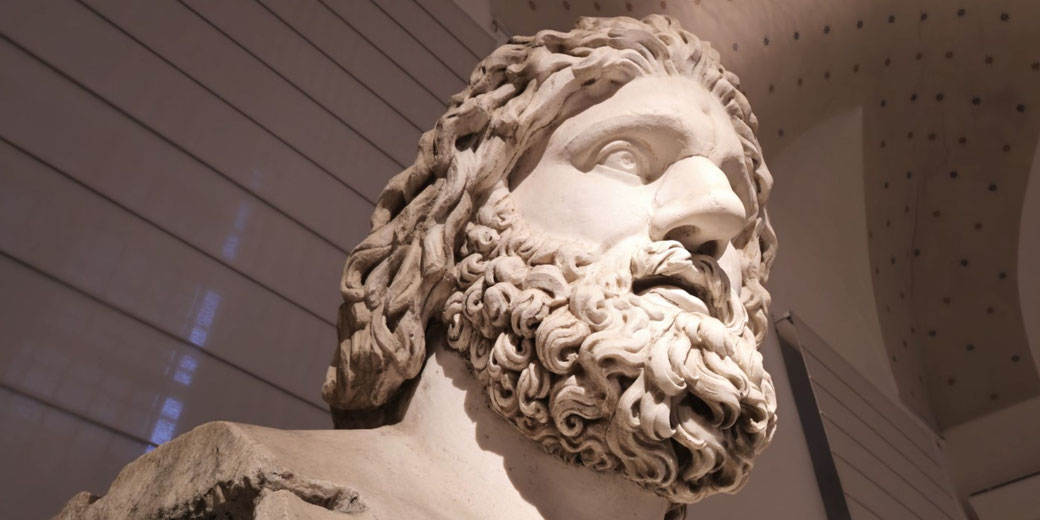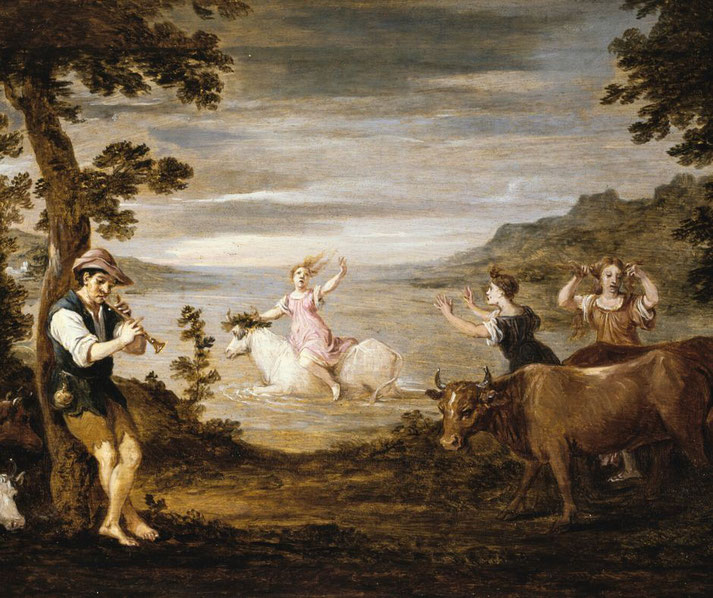The insatiable desires and divine tantrums of Zeus, king of the ancient Greek gods

Zeus was the powerful ruler of Mount Olympus, where he held supreme authority. He was both respected and feared by the people of Greece, because the stories they told about him reveal much about their own values and beliefs.
Many modern readers can easily picture Zeus in their minds, watching over gods and mortals with his powerful lightning bolts.
In reality, he was far from being a model of godhood, and they were shocked to learn about what he was supposed to have done in the myths in which he appears.
Where did Zeus come from?
Zeus was one of the older gods in Greek mythology. According to the tales of Hesiod, he was born to the Titans Cronus and Rhea, and he was the youngest of his siblings.
His father Cronus feared a prophecy that one of his children would overthrow him, so he swallowed each one soon after birth. Because of that, Zeus never saw his siblings grow up.
Rhea wanted to save her youngest, so she hid Zeus’ birth and placed him in a cave on Crete, where he grew up away from his father’s ever-watchful eye.
In his youth, he learned of his father’s harsh rule and decided to fight it. With the help of his mother, he made a plan to free his siblings from Cronus’ stomach.
To do this, he tricked Cronus into drinking a potion that caused him to vomit up his children: Hestia, Demeter, Hera, Hades, and Poseidon. Once freed, his siblings joined him in the struggle.
Together they joined forces to defeat their father and the other Titans.
The war was known as the Titanomachy, and it lasted ten years; ultimately, it became a battle for control of the entire cosmos.
He freed the Cyclopes and the Hecatoncheires (hundred-handed giants), who had been imprisoned by Cronus.
With their help, he and his siblings eventually won the conflict.
The Cyclopes gave Zeus his famous weapon, the thunderbolt, which he used with great effect.
They also gave Poseidon his trident and Hades his helmet of invisibility. It was these gifts turned the tide of the war.
After the victory, Zeus sent the major Titans to Tartarus, which secured his position as the highest ruler of the gods.
Under his new rule, he shared power with his siblings, and created the group of deities called the Olympians, which we know today.
Zeus as the king of the gods
As the King of the Gods, he held unmatched authority on Mount Olympus. He controlled the weather, using his thunderbolt to bring storms or clear skies, and as the god of the sky, his domain included all celestial activities.
Through those powers, he maintained the natural order that was essential to the Greeks’ view of the universe.
Many mythological tales reveal that his decisions often affected the destinies of individuals and entire cities.
He represented both divine justice and terrible revenge, so his decisions were final, and his punishments were quick.
From his throne on Olympus, he resolved disputes among the gods and stepped in to mortal events when needed.
In particular, he was responsible for upholding xenia. This was the ancient Greek idea of hospitality between host and guest.
Under this law, Zeus protected travellers and strangers to make sure they received proper treatment.
For example, his encounters with the mortal king Lycaon, a wicked ruler who tried to test Zeus by serving him a meal made from the flesh of a human child, showed the risks a person would face by insulting the god.
Angered by that horrific act, Zeus changed Lycaon into a wolf and destroyed his palace with a thunderbolt.
The myth was meant to show the Greeks his strong dislike for disrespect and lack of reverence for the gods.
Zeus’ most famous myths
One of the most important myths that involve Zeus is the tale of Prometheus, a Titan who openly went against the ruler of the gods.
Prometheus stole fire from the heavens and gave it to humanity, which made Zeus very angry.
As punishment, Zeus sent Prometheus to suffer forever. He tied him to a rock where an eagle would eat his liver every day.
In a different tale, the king of the gods had a very bad headache and asked Hephaestus, the blacksmith god, for help.
Hephaestus hit the ruler’s head with a hammer, and the goddess Athena emerged from the wound, fully grown and clad in battle gear.
Likewise, in Homer’s Iliad, Zeus took part in the famous Trojan War. On many occasions, he influenced events to guide whether the Greeks or Trojans would succeed.
Zeus’ most problematic stories
The king of the gods frequently got involved in human lives, especially with mortal women.
In several myths, he came down to Earth in a disguise to father many demigods and heroes.
In one story, Zeus saw and fell in love with Io, a priestess of Hera, his sister and wife.
He turned Io into a heifer to hide her from Hera’s jealous eyes. However, Hera guessed the trick and asked for the heifer as a gift.
When she had the creature, Hera gave Argus, the many-eyed giant, the job of guarding her.
In response, Zeus told Hermes to free Io and kill Argus.
Later, in another tale, Callisto, a nymph who followed Artemis, caught Zeus’ attention.
To win her over, he dressed up as Artemis, which led to Callisto becoming pregnant.
Artemis found out and turned Callisto into a bear. At the end, he placed Callisto among the stars as the group called Ursa Major.
Next, the king of the gods wanted Danaë, who had been locked away by her father Acrisius, so he came to her as a shower of gold.
From this unlikely union, Perseus, the famous hero, was born.

In a similar story, he admired the beauty of the Phoenician princess Europa. He changed into a white bull, lured Europa onto his back, and swam across the sea to Crete.
There he revealed his true form, and Europa became the mother of Minos, who later ruled Crete.
Lastly, Semele was a mortal woman and the mother of Dionysus. She trusted Zeus when he came to her in human form.
Hera, his jealous wife, tricked Semele into asking him to show his true form.
Semele could not handle his divine presence and died, but he saved their unborn child.
Dionysus was born from his thigh and became an important god in Greek myths.
Where could ancient Greeks worship Zeus?
Shifting from his stories to his worship, where could ancient Greeks honour the ruler of the gods?
There were many places dedicated to him across the Greek world. The most famous was the Temple of Zeus at Olympia, which was finished around 456 BCE.
This grand building held a giant 12 m tall statue of him and was one of the Seven Wonders of the Ancient World.
Visitors from all over Greece travelled to Olympia to make offerings and to take part in the Olympic Games.
Another key place was the Oracle of Dodona in Epirus. The Dodona site, known as the oldest Greek oracle, was famous for its sacred oak tree.
Priests and priestesses believed the sound of its leaves was a message from Zeus, so people from many regions went to Dodona for his guidance and predictions.
Also, Nemea, a city in the northeastern Peloponnese, held the Nemean Games, similar to the Olympics.
Athletes took part in various sports to honour him. These gatherings celebrated athletic success and helped create strong community bonds among Greek city-states through competition.
In Athens, there was the Temple of Olympian Zeus, called the Olympieion.
Construction started in the 6th century BCE and did not finish until the rule of the Roman Emperor Hadrian in the 2nd century CE.
This large temple had many columns that showed the long-lasting importance and power of the king of the gods in Greek and Roman history.
What do you need help with?
Download ready-to-use digital learning resources
Copyright © History Skills 2014-2025.
Contact via email
With the exception of links to external sites, some historical sources and extracts from specific publications, all content on this website is copyrighted by History Skills. This content may not be copied, republished or redistributed without written permission from the website creator. Please use the Contact page to obtain relevant permission.





